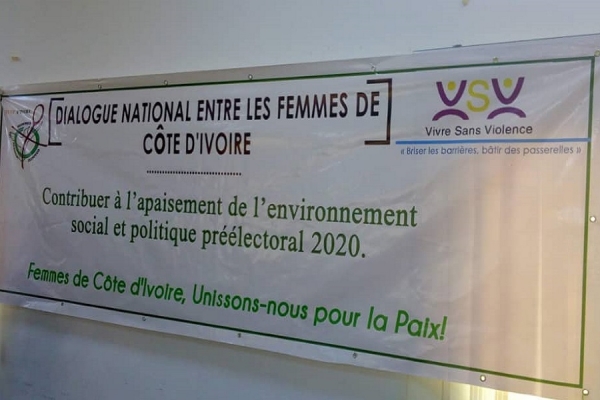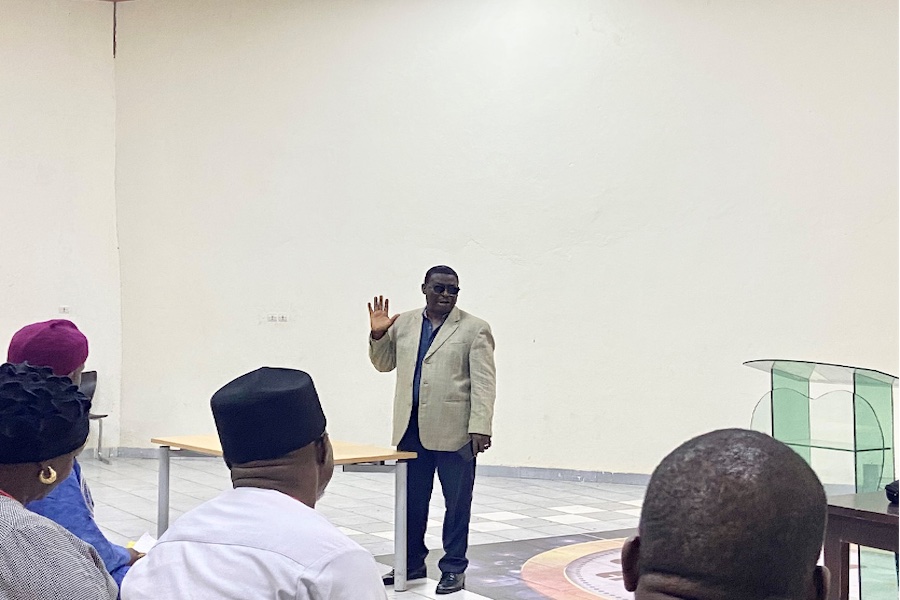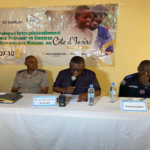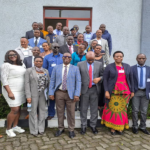Conference Report:
On January 29, 2020, the NGO ‘Vivre Sans Violence’ organized a conference in partnership with the ‘REFSFECO’, around the theme: ‘Dialogue Among Women to Build Peace in Cote d’Ivoire ahead of the 2020 Elections’, at the conference hall of the ECOWAS office in Cote d’Ivoire.
N’Zarama Center for Peacebuilding (NCP) was represented by Ms. Stephanie Minou and Ms. Flaviour Chanda.
The aim of the conference was to contribute to the appeasement of the 2020 pre-electoral social and political environment by mobilizing and structuring women, but also sensitizing them on their role in conflict prevention and peacebuilding in Cote d’Ivoire ahead of the 2020 elections.
The conference was organized into two distinct parts: a). exchanges/discussions, and b). suggested solutions and actions/recommendations.
Exchanges/discussions revolved mainly around the analysis of the current political situation in Cote d’Ivoire. Speakers highlighted several aspects, summarized as follows:
- There is a high level of tension and uncertainty ahead of the 2020 elections;
- Freedom of expression is surpressed;
- There is a high level of fear among the population;
- There is a feeling of being held hostage by political leaders;
- There is limited social cohesion among the different groupings in Ivorian society;
- There is a lack of solidarity and love among women;
- Women tend to exhibit some negative behaviors that do not reflect the true nature of Ivorian women;
- There is a general perception that the government has deliberately failed to issues cards to disenfranchise large segments of the population during the 2020 elections;
- Reconciliation in the country has not been effective;
- Cote d’Ivoire has the potential of becoming a successful post conflict society and can become a role model in the sub-region;
The second part of the agenda focused on suggested solutions and actions/recommendations. Participants suggested a number of solutions, as well as actions. These include:
- An inclusive national dialogue that brings together all political leaders, as it was done during the leadership of Houphouet Boigny, is imperative ahead of the 2020 elections;
- There should be an assessment of the political situation in all regions of the country to determine the chances of peaceful elections in 2020;
- Women should be aware of their potential role in ensuring peaceful elections in 2020;
- Sensitization of women and other stakeholders should be done through social media in order to reach as many people as possible;
- There is an urgent need to strengthen the numbers and the competencies of women in political parties.
- Ivorian women must learn from experiences of other women in the sub-region. Similarly, women’s engagement must prevail, and we must learn from other women’s experiences. This is because there have been great actions taken by women in the past which can inspire the current generation, for instance the women’s walk in 1946 in Grand-Bassam, the Mano River Women’s Peace Initiative. These sorts of initiatives must be encouraged and taken all the way to communities;
- Substantive participation of women in governance and other civic activities must be accompanied by women’s economic empowerment. We must help women boost their income so that they may be able to support themselves;
- The language must change. We must stop labelling women as ‘political women’, but rather as ‘women, mothers, sisters, and wives’. The maternal instinct of women must prevail;
- The spirit of togetherness and solidarity among women must be restored in a sincere way;
- The role of churches must be restated and reinforced in the prevention of violence in the country. In this regard, religious leaders must be encouraged not to contribute to fueling conflicts; but rather get involved in sensitization against conflicts;
- Women must also take note of the importance of social media. All women should have a Facebook account, but also that after the workshop a WhatsApp group could be created in order to continue the discussion;
- Since it is impossible to make ID cards for everybody at the moment, it is best to extend the current ones up until December 2020. This would enable all citizens to vote in the upcoming elections;
- Setting up a situation room ahead of the elections is required to monitor the activities of women and political operatives before, during and after elections;
- The political assessment should help to determine whether or not violence free, fair and credible elections can be held in October as scheduled.
- Prayers for peace should be organized across the country;
- A charter of women in Cote d’Ivoire should be established to define the type of women we want for the country.
Many participants agreed that due to time constraints, it would have been best to organize a workshop which focuses solely on the analysis of the political situation in order to record concrete points to be disseminated, and a second workshop dedicated specifically to the solutions/actions/recommendations. There was also a feeling of ‘déjà vu’ with regards to these sorts of workshops. Many felt that there had been a lot of meetings among women organized to build peace in the country, but that no concrete action had followed afterwards.
The event was particularly insightful and informative. It provided us with a better understanding of the political history of Cote d’Ivoire, but also gave some ideas to be pursued as we seek to mobilize women in leadership positions so that they may become the drivers of peace in Cote d’Ivoire along with young people. Additionally, we are of the belief that there should be a way of disseminating the outcomes of these initiatives to a larger audience, so that many people may become acquainted with them. If political decision-makers (including the president) could take part in such sorts of workshops, it would even be better. This is because dialogue is the means to understanding how people feel, and one thing Ivorians feel, just like the women at the conference, is that they are not being given the opportunity to express their feelings, which in turn constrains the country from achieving true reconciliation.
There were approximately 100 participants from different organizations who took part in the event, including: political parties, faith-based organizations, as well as civil society organizations. Other participants included female public figures, and observers.




